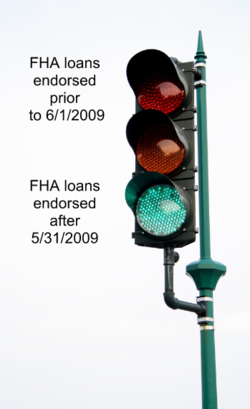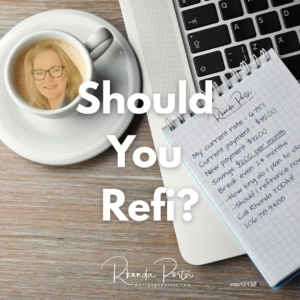UPDATE SEPTEMBER 4, 2012: Odds are back to being a little tricky if you have a Freddie Mac securitized mortgage….bummer! Most of my lenders are limiting us to 105% LTV for Freddie Mac and unlimited LTVs for Fannie Mae.
UPDATE MAY 12, 2012: ODDS ARE GREATLY IMPROVED! We are now working with several lenders who are allowing expanded (unlimited) loan to values, including mortgages with existing private mortgage insurance and lpmi (as long as the mortgage insurance can be transferred). For a quote on a HARP 2.0 refi for your home located in Washington, please contact me.
Many home owners who have been patiently waiting for the expanded guidelines offered with HARP 2 to become available have found frustration. I’m being told that we are going to have the ability to originate HARP mortgages for my clients beyond 105% loan to value “soon” but as of the publishing of this post, I’m still limited to 105% LTV based on Fannie or Freddie’s estimated value of your home.
UPDATE 4/19/2012: Mortgage Master Service Corporation is adding several lenders who are allowing us to do unlimited loan to values! Stay tuned – I’ll have an exciting announcement soon!
UPDATE 5/12/2012: WE’RE COOKING WITH GAS! WE NOW HAVE LENDERS WHO ALLOW EXPANDED LTVS WITH APPRAISAL WAIVERS FOR HARP 2.0.
Click here for your rate quote for your home located anywhere in Washington.
HARP 2 is the Home Affordable Refinance Program which is available to home owners who have their mortgage *securitized by Fannie Mae or Freddie Mac prior to June 1, 2009. *NOTE: this is different than who you make your mortgage payment to (your mortgage servicer).
This program is intended to be a giant band-aid with our housing by allowing qualifed home owners to refinance their underwater mortgages, reducing their mortgage payment and/or term and hopefully stimulating the economy with the extra cash flow. Many are supposed to qualify without having an appraisal – it’s intended to be a streamlined process. It is streamlined and available…for some. For many it may feel like throwing spaghetti on the wall to see what sticks.
What are your odds of obtaining a HARP 2 refinance? It depends on what your scenario looks like. I’ve successfully closed many HARP 2 refinances without (and with) appraisals for both Freddie Mac and Fannie Mae securitized loans. Here’s what I can tell you now (remember, this is my opinion and subject to change…hopefully soon). This is not intended to discourage you from trying to obtain your HARP 2 refinance.
Your odds are strongly in your favor if your loan to value on your first mortgage is 105% or lower and if you do not have any private mortgage insurance. Zillow has seemed to be fairly accurate for estimating value. However the ultimate say on if the value is acceptable to create an “appraisal waiver” is Fannie Mae and Freddie Mac.
Your odds improve more if your mortgage is securitized by Fannie. Freddie seems to be a bit pickier with approvals and sensitve towards new debts or debt to income ratios.
Second mortgages or HELOCs have not been a huge issue [knock on wood]. Most second lien holders have been cooperative and agreeing to subordinate their lien position – even without an appraisal.
Private mortgage insurance is still not where it needs to be with the HARP program. If you have any type of private mortgage insurance, this is an additonal “layer” to work with for your loan approval. The pmi company needs to agree to have the insurance transferred to the new loan and the new lender needs to accept the new pmi. With pmi, your coverage amount will stay the same AND private mortgage insurance companies treat the transferred coverage as a “new loan” (you may be stuck with that pmi for a while on a new HARP loan). Your odds are better with pmi if your loan to value is 95% or lower.
UPDATE 5/12/2012: HARP 2.0 mortgages with private mortgage insurance are not as much of an issue as long as the existing private mortgage insurance can be transferred or if the lpmi can be converted to borrower paid mortgage insurance. Most private mortgage insurance companies are agreeable and we work with lenders who are accepting transferred mortgage insurance.
Odds are worse if your the company who holds your pmi is United Guarantee. UGIC is not cooperating as much as the other pmi companies. UGIC is participating in HARP, however they are not waiving the reps and warrants on the original file. Therefore they request and require the original package from the current mortgage servicer and it takes a lot longer than the other MI companies.
Current odds are [NOT] lower if you have LPMI (lender paid mortgage insurance). Your best bet may be to try your existing mortgage servicer to see if they can help you with your HARP 2 refi. It’s my understanding, some mortgage servicers are refusing to help their very own clients with this program. Depending on the type of lender paid mortgage insurance (how the premium was structured) it may be fairly simple to help you with HARP 2.0. Just like regular pmi, as long as the private mortgage insurance company allows it to be transferred and be “borrower paid” (some lpmi loans can be coverted to bpmi – borrower paid), we have lenders who will accept the pmi. YOU DO NOT HAVE TO GO BACK TO YOUR BANK OR MORTGAGE SERVICER WITH AN LPMI HARP 2.0 REFINANCE.
Again, I looking forward to sharing with you that I have unlimited LTVs and can help any Washington borrower who has pmi or lpmi but it’s just not the case “right now”. We are working on bringing on more lenders who may allow expanded guidelines that other banks seem to be restricting. Currently, I can help most borrowers who need a HARP 2 refi as long as the loan to value doesn’t exceed 105% per Fannie Mae or Freddie Mac’s estimated value of your Washington home. UPDATE 5/12/2012: With the lenders we now work with, we have no loan to value restrictions for Fannie or Freddie and pmi or lpmi is probably not an issue.
It’s very frustrating to see the overlays banks and mortgage servicers have put on the HARP 2. Banks are limiting the availability of a program that is designed to help stabilize housing and the economy. This needs to change. HARP needs to be widely available to all home owners who qualify.
I’m happy to review your HARP 2 scenario for your home located any where in Washington. I have successfully helped many home owners refinance with the Home Affordable Refinance Program, including investment properties and second homes.
If you would like me to provide a rate quote for your HARP 2 refinance, click here.
I am required to have the language below if I am soliciting your Home Affordable Refi for your home in Washington…and yes, I would love to help you with your HARP (or any) refinance:
Freddie Mac and Fannie Mae have adopted changes to the Home Affordable Refinance program (HARP) and you may be eligible to take advantages of these changes.
If your mortgage is owned or guaranteed by either Freddie Mac or Fannie Mae, you may be eligible to refinance your mortgage under the enhanced and expanded provisions of HARP.
You can determine whether your mortgage is owned by either Freddie Mac or Fannie Mae by checking the following websites:www.freddiemac.com/mymortgage orhttp://www.fanniemae.com/loanlookup/


 Refinancing with a HELOC or Second Mortgage (2026 Guide)
Refinancing with a HELOC or Second Mortgage (2026 Guide)






Recent Comments